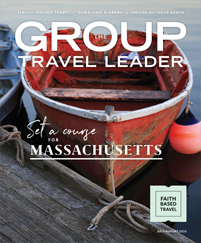There are a lot of benefits to traveling with a group, so how does the potential group leader begin forming a group and getting a trip off the ground? It starts with identifying your potential travel companions.
Identifying your potential travelers
As a beginning group leader, you would be wise to always keep the social appeal of group travel in mind. As a result, you are most likely to be successful by introducing travel programs into the list of benefits provided to members of existing organizations that already have a social component.
It surely doesn’t take much imagination to realize that individuals who belong to an established club or group are already “joiners,” and if they already enjoy socializing with their fellow members, they are likely to be much more receptive to taking their friendships “on the road.” These folks have previously established personal relationships that a smart group travel leader can capitalize on, rather than attempting to begin from scratch.
Trying to create a viable travel group or club from a group of individuals who don’t know each other and haven’t previously socialized with each other is sure to be a daunting, if not impossible task. These “potential” travelers have absolutely no reason to travel with other people they’ve probably never met before, unless they just coincidentally want to go where the trip is heading, on the exact date that the trip is departing, and they are happy with the price being charged.
One exception to this rule is if the group leader (or “pied piper”) is a recognized community celebrity (retired or current media personality, clergyman, sports star, etc.) whose name alone is enough to bring in fans or admirers attracted by the prospects of “rubbing elbows” with an established “VIP.”
Traditional and non-traditional groups
Group travel has long been a tradition of numerous civic and social organizations. Thse include senior centers, bank clubs (loyalty programs), church and faith-based organizations, corporate retirees’ clubs, parks and recreation department programs, service clubs (Rotary, Lions, Kiwanis, etc.), Masonic and lodge organizations, family reunions, social clubs, neighborhood or housing development associations, school-sponsored student trips, performance (band, orchestra or chorus) trips, community college travel programs, historical societies, arts organization patron trips, alumni groups, class reunions, garden clubs, sports team fans (organized by sports bars or by the teams themselves), ethnic/cultural organizations, “Red Hat” groups, and more.
Today, the travel industry is seeing more interest from “non-traditional” groups as well. These can be just about any kind of group that has come together for common purposes: Civil War buffs, river rafters, hikers, photography clubs, culinary schools, wine lovers (frequently organized by a wine merchant or liquor store), movie buffs, book clubs, community theatre groups, golf and country clubs, gyms and health clubs, etc. Finding a group of travelers may be as easy as identifying one of these common interests — the sky is limited to your imagination!
Gauging interest and building consensus
Once you have some ideas about a group that you would like to travel with, you need to talk to these people, find out if they are interested in trips, and start to generate buzz for your idea. Always remember that absolutely the worst thing that can happen when you ask someone about travel is that they’ll say no. And nobody will have the opportunity to say yes unless you ask them in the first place.
As you do this, make sure to talk with organization officers and members individually, and identify and seek the support of group “decision makers.” Openly solicit ideas, input and objections from potential travelers. But don’t form, seek or expect quality decisions to be made by committees. And remember that there is a very big difference between simply wanting to take a trip, and actually putting one’s money down to do so!
Coming up next: Covering your legal and insurance responsibilities











